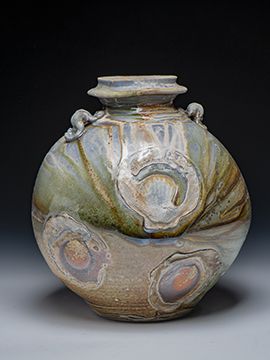Ceramics Saggar Firing

Ceramic artist brenda mcmahon shows how to wrap a pot in a paper clay saggar in preparation for a saggar firing.
Ceramics saggar firing. This excerpt came from our book naked raku and related bare clay techniques which is available in the ceramic arts shop. Then i either place the pot in and gently put other materials around the side of the pot or wrap and tie materials in place around the pot using copper wire reed or even string and then place it into the saggar. Saggar firing is the method of creating confined atmospheres within a container or saggar. Because the saggar protects the pot while firing it is not important to have a clay body that withstands the thermal shock of raku firing.
Saggar firing was originally developed to protect wares from ash slagging and flame flashing in wood firings but in contemporary use with clean burning gas firings the process is used in exactly the opposite way. To contain fumes around a pot so that the pot to picks up color from the fumes saggars are the lidded containers used to contain and isolate pots during a saggar firing. Here is a non exclusive list of colorants for pit firing or to be used inside of a saggar. I put a bed of materials on the bottom of the saggar and place small crucibles made of clay containing salt around the bottom.
The saggar takes the abuse of rapid thermal changes. This hands on technique will help all potter. Saggar is a container used during the firing process to enclose or protect ware being fired inside a kiln. There are many things that will produce colors some better than others when placed in the pit.
A saggar is a type of kiln furniture. The name may be a contraction of the word safeguard. The saggar can be made out of anything depending on the type of firing from the traditional refractory clay to newspaper. Saggars have been used to protect or safeguard ware from open flame smoke gases and kiln debris.
Traditionally saggars were made primarily from fireclay.














































